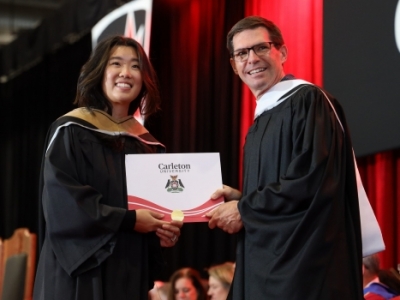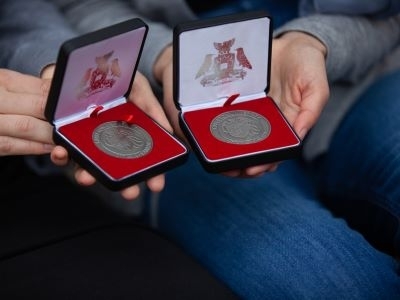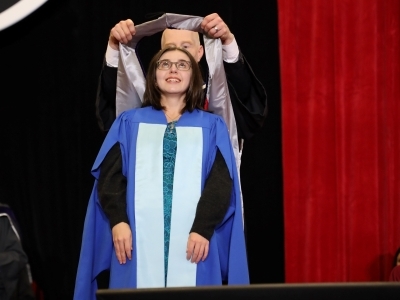Did you know that a caribou can walk on thinner and younger ice than humans despite being about 200 pounds? This is just one of the many things Emmelie Paquette has learned during her research on caribou in Uqsuqtuuq (Gjoa Haven, Nunavut).
Paquette, a Masters student in the Department of Geography and Environmental Studies is looking at changes in sea ice conditions and ship traffic in Uqsuqtuuq in relation to caribou crossing areas on Qikiqtaq (King William Island).
“We use diverse and interdisciplinary methods to characterize changes in sea ice break-up/freeze-up timing, and changes in shipping traffic, within tuktuit (caribou) crossing areas surrounding Qikiqtaq,” explained Paquette. “We hope this contributes to our greater understanding of the interplay between tuktuit, sea ice, and Arctic ship traffic.”
Throughout her research, Paquette is collaborating with the Inuit community of Uqsuqtuuq and addressing concerns expressed by the community surrounding caribou migration.
“My personal interest in the project stems from a love of northern Canadian environments, and a deep respect for Inuit knowledge and its importance for a changing Arctic.”
As a part of Paquette’s analysis, she held four workshops this past year with small groups of Elders, hunters and members of the Hunters and Trappers Association. These were facilitated by Simon Okpakok, project collaborator and research coordinator. In this way, she was able to learn about tuktuit and sea ice and ship traffic surrounding Qikiqtaq and also received feedback on her preliminary analysis of sea ice charts and ship traffic data around Qikiqtaq.
“The stories that were shared and the knowledge learned from Uqsuqtuurmiut who participated in our workshops were incredibly valuable and important,” said Paquette. “Their knowledge helped orient the project locally, and deepen its connection to community members. There is only so much we can understand about local sea ice conditions, ship traffic, and tuktuit surrounding Qikiqtaq from here in Ottawa. I learned a lot from engaging with and hearing the knowledge of Uqsuqtuurmiut men and women in the workshops.”
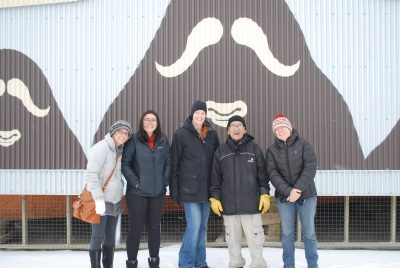
Dr. Gita Ljubicic has been supervising Paquette throughout her research. Paquette emphasises the fact that once she met Dr. Gita Ljubicic it became evident that Carleton would be the perfect school for her graduate studies. Dr. Ljubicic and Paquette’s research interests align very closely, which means they are working very closely on the Qikiqtaq project.
“Dr. Ljubicic has been an incredible supervisor throughout my time at Carleton. Her kind, thoughtful, and attentive approach to mentorship has helped foster my passion for respectful Arctic research, and education. Her actions, both in the South and the North, are standards of excellence in research by emphasizing community perspectives and priorities and dedicating time and effort to important relationship building practices. I feel very privileged for these opportunities to work with her, and to be her student.”
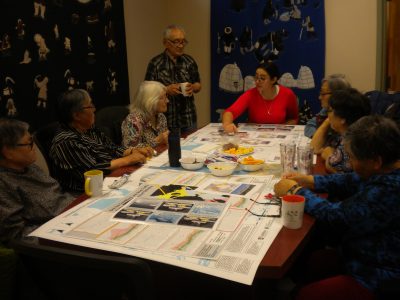 Paquette continues to impact Uqsuqtuurmiut with her research by sharing her findings with the community in different ways, such as trip reports, phone calls, and posters.
Paquette continues to impact Uqsuqtuurmiut with her research by sharing her findings with the community in different ways, such as trip reports, phone calls, and posters.
“My hope in the coming years is to continue working with the community of Uqsuqtuuq, and build relationships to assist in addressing community research priorities and the development of opportunities for education and positive cultural experiences for those most impacted by social and ecological changes.”
Thursday, May 9, 2019 in Grad Student Research, News
Share: Twitter, Facebook
